Auguste "Gusti" Huber was an Austrian-American actress. She had a successful career on Broadway and was critically acclaimed as Edith Frank in the 1956 production of The Diary of Anne Frank.
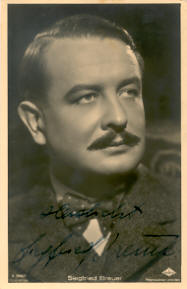
Siegfried Breuer was an Austrian stage and film actor and occasional film director and screenwriter.
Anna Christina Maria "Christl" Mardayn was an Austrian actress/singer.

Anni is a 1948 Austrian-German historical romance film directed by Max Neufeld and starring Elfie Mayerhofer, Siegfried Breuer and Josef Meinrad. It is part of the genre of Vienna films.
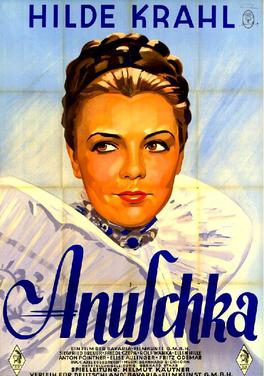
Anuschka is a 1942 German historical drama film directed by Helmut Käutner, and starring Hilde Krahl, Siegfried Breuer and Friedl Czepa. It was shot at the Barrandov Studios in Prague and Cinecitta in Rome. Location filming took place in Carinthia. The film's sets were designed by art director Ludwig Reiber.
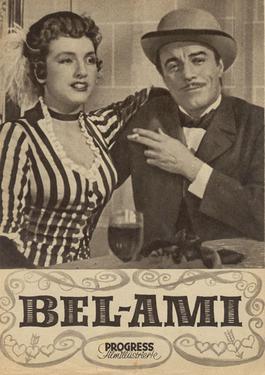
Bel Ami is a 1955 historical drama film directed by Louis Daquin and starring Anne Vernon, Renée Faure and Jean Danet. It was a co-production of Austria, France and East Germany. The film was shot in the Soviet-controlled Rosenhügel Studios in Vienna.

The Young Baron Neuhaus is a 1934 German historical drama film directed and co-written by Gustav Ucicky and starring Viktor de Kowa, Käthe von Nagy and Christl Mardayn. Produced and distributed by UFA, it was shot at the company's Babelsberg Studios in Berlin and on location around Vienna. The film's sets were designed by the art directors Robert Herlth and Walter Röhrig.
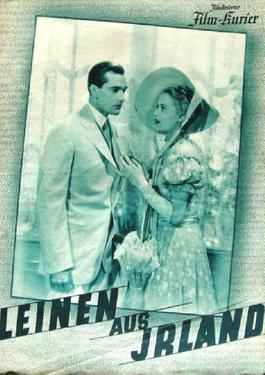
Linen from Ireland is a 1939 German drama film directed by Heinz Helbig and starring Otto Treßler, Irene von Meyendorff, and Friedl Haerlin. It was part of an ongoing campaign of anti-Semitism in German cinema of the era, and was also intended to discredit the governance of the old Austro-Hungarian Empire. By the time of the film's release in October 1939, Britain and Germany were at war, so it was also useful in creating anti-British sentiment.

Everything Will Be Better in the Morning is a 1948 German comedy film directed by Arthur Maria Rabenalt and starring Ellen Schwanneke, Jakob Tiedtke and Grethe Weiser.

The Leghorn Hat is a 1939 German period comedy film directed by Wolfgang Liebeneiner and starring Heinz Rühmann, Herti Kirchner and Christl Mardayn. It is based on the 1851 play The Italian Straw Hat written by Eugène Labiche, which has been adapted for the screen on several occasions.

A Mother's Love or Mother Love is a 1939 drama film directed by Gustav Ucicky and starring Käthe Dorsch, Paul Hörbiger and Wolf Albach-Retty.
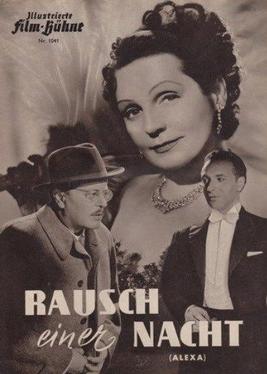
One Night's Intoxication is a 1951 West German romantic drama film directed by Eduard von Borsody and starring Christl Mardayn, Richard Häussler and Paul Dahlke. In Austria it was known by the title Alexa.

The Dark Star is a 1955 West German drama film directed by Hermann Kugelstadt and starring Elfie Fiegert, Ilse Steppat and Viktor Staal.

The Last Waltz is a 1953 West German musical romance film directed by Arthur Maria Rabenalt, and starring Eva Bartok, Curd Jürgens, and O. E. Hasse. It is an operetta film, based on the 1920 work The Last Waltz by Oscar Straus. It was one of several film adaptations of the operetta. It was shot partly at the Wiesbaden Studios in Hesse and on location in the Rhineland. The film's sets were designed by the art director Max Mellin.

Orient Express is a 1944 German thriller film directed by Viktor Tourjansky and starring Siegfried Breuer, Gusti Wolf and Rudolf Prack. It was shot at the Bavaria Studios in Munich. The film's sets were designed by the art director Ludwig Reiber.
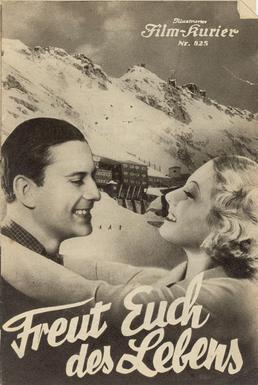
Enjoy Yourselves is a 1934 German musical comedy film directed by Hans Steinhoff and starring Dorit Kreysler, Ida Wüst and Wolfgang Liebeneiner. The film's sets were designed by the art directors Artur Günther and Benno von Arent. It premiered at the Ufa-Palast am Zoo in Berlin.

Maresi is a 1948 Austrian period drama film directed by Hans Thimig and starring Attila Hörbiger, Maria Schell and Siegfried Breuer. It was one of the box offices successes of 1948.

Regimental Music is a 1950 German drama film directed by Arthur Maria Rabenalt and starring Heidemarie Hatheyer, Friedrich Domin and Siegfried Breuer. It was an Überläufer, a film made predominantly during the Second World War but not released until after the fall of the Nazi regime. It was based on the novel Die Schuld der Gabriele Rottweil by Hans Gustl Kernmayr and it sometimes known by this title. It was shot at the Bavaria Studios in Munich. The film's sets were designed by the art directors Rudolf Pfenninger and Ludwig Reiber. The film's direction was originally assigned to Georg Wilhelm Pabst before he was replaced by Rabenalt.
















